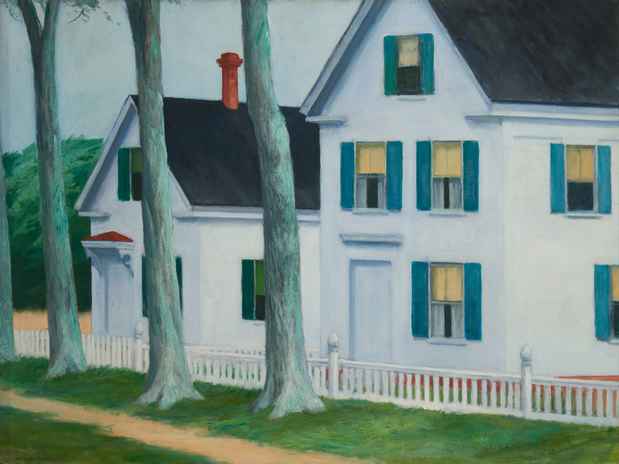“Edward Hopper as Puritan” Exhibition
Craig F. Starr Associates

[Image: Edward Hopper "Two Puritans" (1945) Oil on canvas 30 x 40 in.]
This event has ended.
Craig Starr Gallery presents Edward Hopper as Puritan. This exhibition brings together a selection of paintings, watercolors, and etchings by Edward Hopper, one of the most important painters of modern American life. The show focuses on Hopper’s depictions of rural and coastal landscapes in New England between 1920 and 1945. The selection examines Hopper’s interest in the everyday activities and structures of Gloucester and Cape Cod.
When Hopper first arrived in Gloucester in midsummer 1923, he was forty-one years old and primarily known as a printmaker. He took up watercolor that summer, at the urging of Jo Nivinson, whom he had just met and would later become his wife. He roamed all over Cape Ann, producing seventeen watercolors in Gloucester and establishing the subjects he would pursue in the future–local houses, both the mansions of prosperous merchants and the humbler dwellings of fishermen; churches and lighthouses; and ships, chiefly hardworking fishing trawlers.
Group of Houses, on view at the gallery, likely belonged to this set of watercolors. A portrait of a row of saltbox houses captured at an oblique angle, Hopper’s chosen composition emphasizes the pattern and uniformity of the architecture, encapsulating a sense of the plain and unpretentious aesthetic he considered native to New England.
By the 1930s, the Hoppers began to split their time between New York City and South Truro on Cape Cod, where they built a second home in 1934. They first summered on the Cape in 1930 and were enchanted by the raw, unspoiled landscape. His 1932 watercolor Kelly Jenness House explores the contrast between the simple architectural geometry and the undulating rhythms of the surrounding landscape. The Jenesses were among the Hoppers’ earliest friends in South Truro and, as scholar Louis Shadwick has remarked, this watercolor evokes the humble but firm moral strength Jo and Edward associated with the Jeness family.
Hopper’s important canvas Two Puritans, also on view, has often been read as a symbolic portrait of Edward and Jo. Painted in 1945, the two houses appear as both part of the New England community and withdrawn from it. Through a seemingly calm and ordered composition, the work conveys a paradoxical sense of both comfort and alienation, a feeling of community but also retreat from modern life.
A fully illustrated catalogue will accompany the exhibition and include a new essay by Louis Shadwick, writer, art historian and lecturer at the Courtauld Institute of Art in London.
Media
Schedule
from November 26, 2023 to February 17, 2024